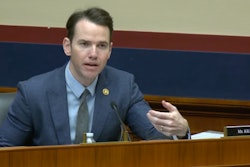Sue Lawless, acting deputy administrator of the Federal Motor Carrier Safety Administration, delivered a brief update from her agency Monday at the Truckload Carriers Association annual convention in Nashville, spelling out some of the initiatives that FMCSA expects will lead to zero traffic fatalities on U.S. roads.
Lawless, who has served as acting deputy administrator since Robin Hutcheson resigned effective Jan. 26 and previously served as the group's executive director and chief safety officer, championed the Safe System approach that she expects to lead the goal of zero death – "the only acceptable number," she said. A Safe System approach was founded on the principles that humans make mistakes and that human bodies have limited ability to tolerate crash impact. Applying the Safe System approach involves anticipating human mistakes by designing and managing road infrastructure to keep the risk of a mistake low and so when a mistake leads to a crash, the impact on the human body doesn’t result in a fatality or serious injury. Road design and management should encourage safe speeds and manipulate appropriate crash angles to reduce injury severity, according to the Department of Transportation.
Lawless chided the idea that zero fatalities is impossible, noting the goal encompasses a cultural shift of sorts and that it doesn't lay the responsibility solely on the trucking industry (with improvement needed in healthcare and technology, among others). Many of the initiatives are designed to improve overall trucking conditions like safe parking, detention and driver compensation.
"We know creating more and better and safer truck parking is fundamental (to safety)," Lawless said.
She said the bipartisan infrastructure law attempts to take a big swing at solving truck parking and from 2023 to 2024 provided $180 million for truck parking in Florida, over $90 million in Missouri and $22 million in Tennessee.
FMCSA, too, is working on research to identify where the most demand is for parking "to calculate the cost and benefit of investing in parking," she added.
A driver compensation study launched recently by FMCSA is hopeful to uncover how pay influences drivers to seek different careers because Lawless said, "we know the longer drivers stay in the industry, the safer they become."
She added that among the charges of her organization's Truck Leasing Task Force is to help understand how leasing agreements could disincentivize safety. All these, Lawless said, were attempts by FMCSA to better understand collision prevention and understand how and why they happen so they can be prevented.
Among the ongoing items FMCSA continues to pursue is the implementation of hair sample testing in drug screenings and "working to get an (Automatic Emergency Braking) rule over the finish line." FMCSA and the National Highway Traffic Safety Administration are jointly pursuing rulemaking to require truck OEMs install AEB systems on new trucks and for fleets to maintain those systems. Publication of the final rulemaking is expected later this year, including a compliance date.
"Technology has the promise of saving lives," Lawless said.












